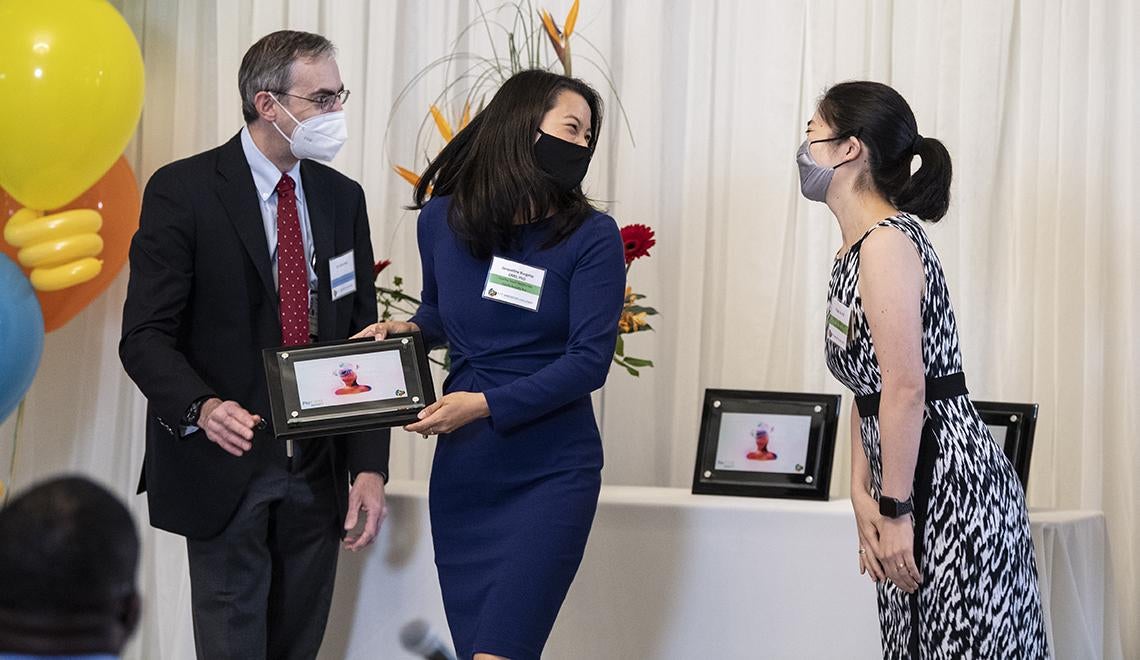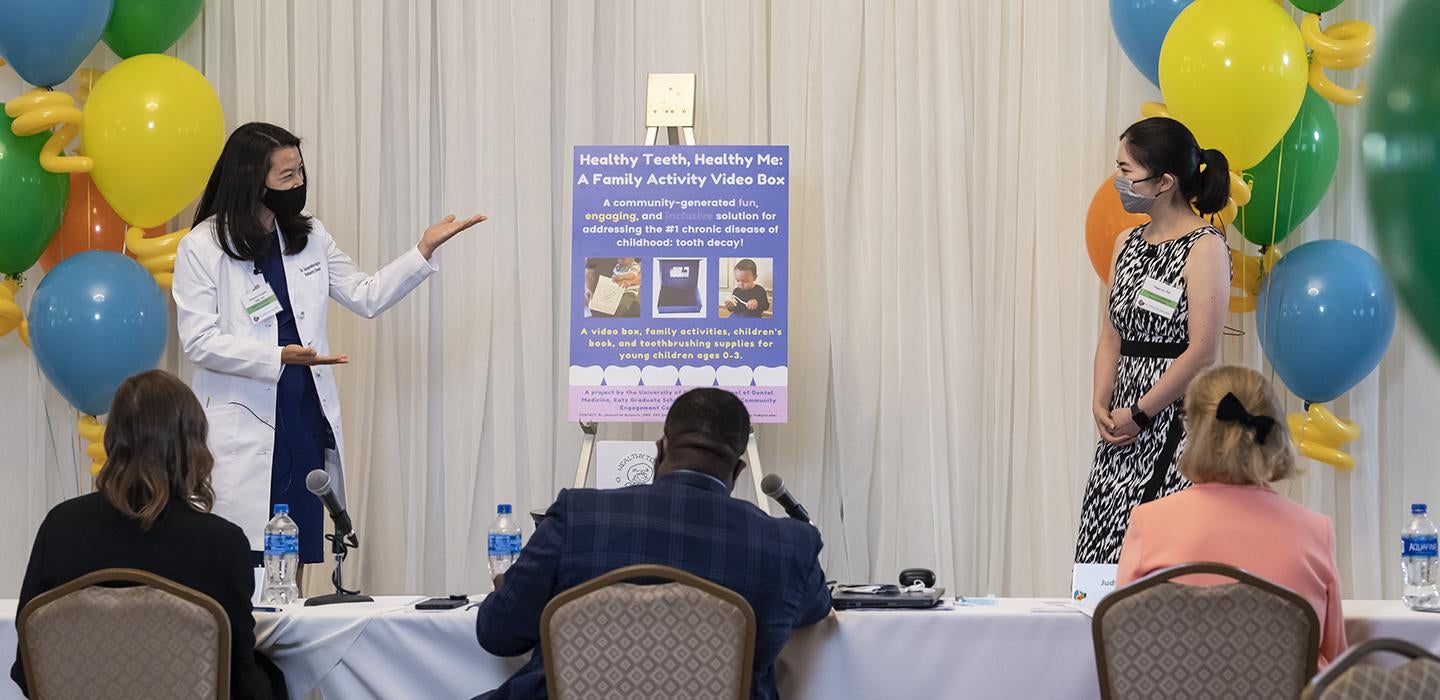
Subscribe to Pittwire Today
Get the most interesting and important stories from the University of Pittsburgh.Two Pitt professors aim to change that with a subscription box of fun, engaging and easy to understand materials for families to learn about dental health and put healthy activities into practice.
The Healthy Teeth, Healthy Me Family Activity Box contains interactive family-friendly educational activities and gifts that help prevent tooth decay, said co-inventor Jacqueline Burgette, an assistant professor in the Departments of Dental Public Health and Pediatric Dentistry.
After asking Pittsburgh mothers about their children's oral health needs, Burgette co-founded the activity box with Peggy Liu, Ben L. Fryrear Chair in Marketing and associate professor of business administration in the Joseph M. Katz Graduate School of Business.
"We sought to develop a solution inspired by and accessible to the community. The activity box enables families to promote child health in their own home, where the action happens," Burgette said.
As a top winner of this year's Pitt Innovation Challenge (PInCh), Burgette and Liu’s goal is within reach. PInCh is an annual program established by the University's Clinical and Translation Science Institute (CTSI) that is designed to help innovators change lives through scientific research. Top winners receive funding and support, enabling their projects to advance to the next level.
Healthy Teeth Healthy Me, along with the projects Parenting While Black: Healing and Growing Together and NextGenET, received the top prize of $100,000, plus a $15,000 bonus award for addressing a health disparity. This year saw six out of forty-six teams reviewed and chosen by over 80 judges throughout Western Pennsylvania. All six finalist teams and seven out of the eight PInCh 2021 awardees received this bonus award, Steven E. Reis, CTSI director and associate senior vice chancellor for clinical and translational research in the health sciences, was “pleased” to announce.
“Funding is a significant gamechanger for projects like this one,” said Liu. “This $115,000 will allow us to test our box and examine whether it truly works to help increase healthy teeth habits in young children.”
Liu and Burgette will conduct a two-phase multi-methods study. The first phase will comprise interviewing families with children under three years old in demographically diverse Pittsburgh areas on the box's design, content and usability. The second phase will consist of a randomized control trial with 300 families to test the box's effectiveness.
Parenting While Black
Each of the top projects offered an innovative solution to a challenging health problem.
“When we looked around at the other PInCh competition finalists, we saw a very diverse body with a range of innovative projects covering multiple issues affecting communities of color,” said James Huguley, associate dean for Diversity, Equity and Inclusion in the School of Social Work, and the PWB lead. “PInCh highlights the work of teams in a way that gives resources and attention to issues that otherwise might not receive the investments they deserve.”
Parenting While Black is a program that provides Black parents with tools that promote positive racial socialization, mental health and academic achievement in their children. The program includes six sessions for parents that combine group discussions, presentations, activities and one-on-one coaching to promote successful parenting in the face of oppressive factors.
“The story of the Black family is one of resilience, and our work supports those intergenerational efforts,” said Huguley. “Events like George Floyd may have been shocking to the general public, but they were not to the Black community. We’ve known thousands of George Floyds over the generations and have experienced these traumas up close through the years.”

NextGenET
Carl Snyderman, a professor in the School of Medicine, co-invented NextGenET with Garrett Coyan, the chief cardiothoracic surgery resident at UPMC. The product is a simplified, low-cost endotracheal tube system that prevents ventilator-associated infections and pneumonia by stopping harmful bacteria from entering the lungs. The risk of getting aspiration pneumonia increases the longer a patient is reliant on a tube.
"This is a dire health problem," said Coyan, who is also a postdoctoral fellow in cardiovascular engineering at the McGowan Institute for Regenerative Medicine. "Even before COVID, we saw about 250,000 deaths in the U.S. every year from ventilator-associated pneumonias. A lot of that occurs because we haven't changed the design of those endotracheal tubes in the last 50 years." Snyderman and Coyan initially met three years ago while working at the Center for Medical Innovation (CMI) on a different ventilator problem — a meeting they both described as fortuitous given their complementary areas of expertise.
“I'm a head neck surgeon; he's a thoracic surgeon, so we come at the airway from different perspectives,” said Snyderman, the otolaryngology director of the Center for Cranial Base Surgery at UPMC. At the CMI they’d both independently sought to eliminate endotracheal tube migration due to the harm they observed it causing patients. But in talking to customers and stakeholders, they identified this much larger issue and pivoted their focus.
"We changed our solution from one design to a very different radical design," said Snyderman. "It shows the innovation process and that you start in one place, but never know where you're going to end up. Winning means we can finish our testing and settle on a design that solves the problem we're addressing."
Diverse impacts
“Pittsburgh has one of the poorest Black communities in the U.S., and its issues are emblematic of migrant Black populations that moved to major northern cities throughout the country,” said Huguley. “If we can do good racial equity work here, it’s highly likely it will translate to a national audience.”
Dental care is number one on the list of unmet child health needs during the COVID-19 pandemic, and one that Liu and Burgette recognize disproportionately affects children of color in disadvantaged communities. Liu noted that health education materials usually involve literacy barriers, and aren't fun, engaging or community-sensitive — issues not exclusive to Pittsburgh.
“Not doing something about it is has perpetuated long-term health disparities,” said Burgette.
According to Coyan, the PInCh competition aids in honing skills that physicians, scientists and researchers aren't taught and affirms Pitt's commitment to diversity - a sentiment shared by others.
"Pitt's CTSI offers support and preparation to help teams think through the problem they're addressing and the solution they're proposing," said Liu. "Such support is especially valuable for many diverse teams that might otherwise not have a seat at the table."
All winners
A total of $550,000 was awarded to eight teams during PInCh 2021, representing the largest award amount in the past nine program cycles.
The following were each awarded $50,000:
DouLAS-AC (Margaret Rosenzweig), a doula model to provide dignity, legacy, advocacy and support for individuals with advanced cancer in the Pittsburgh Black community.
The O2 Cube (Kilichan Gurleyik), a solar powered supplemental oxygen system for rural health centers that lack grid electricity.
TRIBUTE for Bereavement in Communities of Color (Laura Deitz), a training program for paraprofessionals in communities of color to provide interpersonal psychotherapy to reduce bereavement-related depression.
See all this year’s winners on the Pitt Innovation Challenge website.
— Kara Henderson


